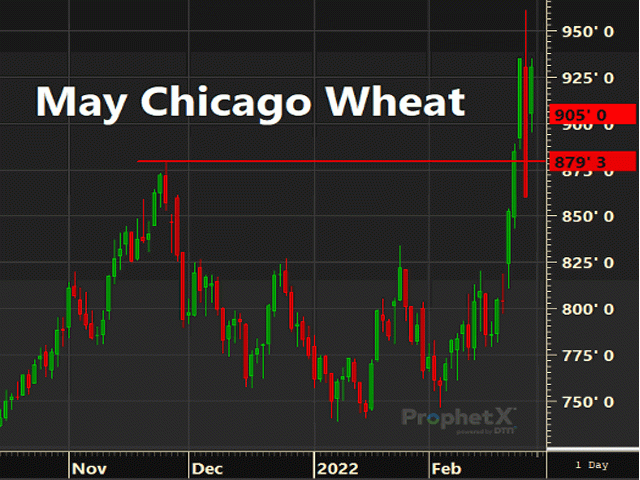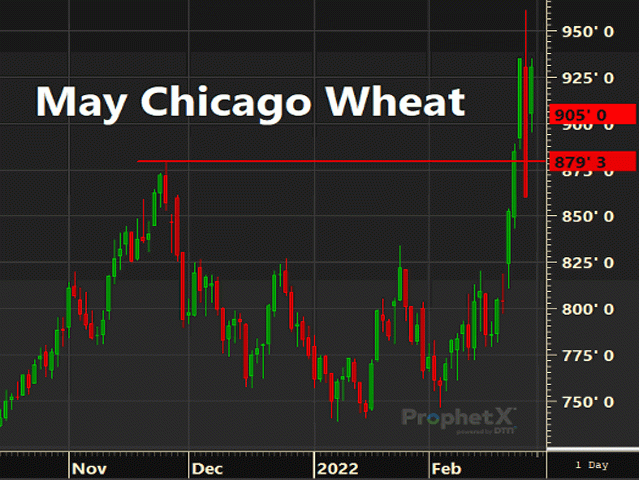Technically Speaking
Volatility in Grains Requires Closer Examination
Volatile trade has been the name of the game in grains of late, and corn has been no exception. The May contract surged to new contract highs last week with trade up to $7.16 1/4 before correcting sharply lower the following session. This plunge in momentum helped spur a bearish divergence with price, a conspicuous indicator considering the price levels being entertained. Momentum, according to stochastics, peaked on Jan. 28 when May futures settled at $6.33 1/4. The second peak in stochastics came on Feb. 23, the day before price peaked, tracing out a textbook bearish divergence with price. That said, this bearish divergence can only be confirmed by price failing below a level of technical merit like the corrective high from Feb. 10 at $6.60 1/2 and sustaining that weakness. Until or unless that happens, trends are still up with a potential bearish divergence in momentum not enough to threaten the current bull move. With the intense volatility present, risk parameters for gauging directional bias need to be understandably wide. At current, we like the $6.55 1/2 corrective low from Friday to the downside and the $7.01 3/4 corrective high from Thursday to the upside. With these issues considered, a bullish policy remains advised in corn futures with sustained weakness below $6.55 to $6.60 needed to alter this count.
P[L1] D[0x0] M[300x250] OOP[F] ADUNIT[] T[]
Minneapolis wheat has enjoyed a violent ride just like the rest of the grain space the last week or so. Last Thursday, Minneapolis futures made new contract highs above $10.60 per bushel, but failed to notch a new high close, falling back below the preponderance of trade from October and November. In doing so, momentum indicators turned down sharply and the daily close-only chart suggests the entire rally from Jan. 14 to Feb. 24 was corrective in nature. Under the Elliot Wave Count principles, if the rally from mid-January to the end of February was in fact corrective, it would warn of the C-wave extending lower and taking out the lows from mid-January. It is far too early in this wave count to forecast something like that; but it remains a technical possibility at this juncture. Minneapolis' winter wheat brethren enjoyed a stronger chart picture last week and overnight into Monday and are not warning of looming weakness. It is difficult to say Minneapolis is prepared to go where winter wheat contracts are not, but it is a possibility which much be explored. For risk parameters, we would look at the $9.60 lows from Friday to the downside and the $10.24 3/4 corrective highs to the upside to base directional decisions.
MAY CHICAGO WHEAT:Chicago wheat has been at the forefront of the erratic trade in grains, closing limit up last Thursday only to be followed by an expanded limit-lower close on Friday. In overnight trade, Chicago wheat has clawed back two-thirds of Friday's limit-down close. Importantly, Chicago wheat has managed to climb back above the previous contract highs from Nov. 24 at $8.79. To maintain bullish posture, the May contract needs to retain strength above that level. We would never want to call a technical condition "simple," but with respect to Chicago wheat, the May contract simply needs to stay above those November highs to keep the bulls fed. Sustained weakness below that level would be enough to confirm a bearish divergence in momentum and shift bullish posture to neutral or even bearish. To the upside, the corrective high at $9.60 3/4 is the level needed to overcome to reinstate a full bullish policy with accelerating gains expected.
Comments above are for educational purposes and are not meant to be specific trade recommendations. The buying and selling of grains and grain futures involve substantial risk and are not suitable for everyone.
Tregg Cronin can be reached at tmcronin31@gmail.com
Follow Tregg on Twitter @5thWave_tcronin
(c) Copyright 2022 DTN, LLC. All rights reserved.






Comments
To comment, please Log In or Join our Community .